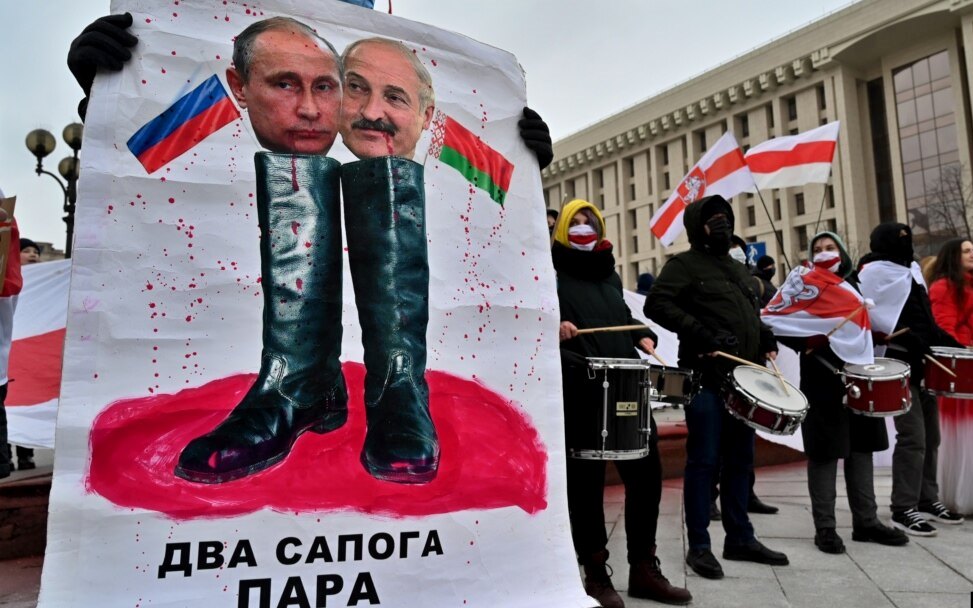The regime demands additional security guarantees from Russia
 The situation has not changed
The situation has not changed

Minsk and Moscow are preparing to sign an agreement on mutual security guarantees. Lukashenka is looking for additional ways to protect himself in case a new large-scale Russian offensive into Ukraine from Belarusian territory fails in 2024, and the politician remains face to face with the Ukrainian Armed Forces and NATO.
State Secretary of the Security Council of Belarus, Aliaksandr Valfovich, and his Russian counterpart Nikolai Patrushev held a working meeting on November 8 in Moscow and discussed deepening cooperation between the intelligence services and military departments. New approaches to ensuring security in connection with changes in the military-political situation in Europe were also discussed. Special emphasis was placed on countering security challenges and threats from Ukraine. The parties exchanged views on the agenda for the meeting of the Committee of Secretaries of the CSTO Security Councils, which will be held in November in Minsk.
The Security Concept of the Union State was also discussed; work on the document is being completed. All fundamental issues have been resolved. In 2024, the concept will be presented for signing at a meeting of the Supreme State Council of the Union State.
As a result of the negotiations, Belarus and Russia signed an action plan to develop cooperation between the security council apparatuses for 2024-2025. The document allows for work to be carried out on a planned basis to ensure the security of countries. Among the most pressing issues is the preparation of an agreement on mutual security guarantees between Russia and Belarus.
Lukashenka officially asked Russia to expand security guarantees against external attack back in April. The Belarusian politician defined the desired level of guarantees as follows: “Russia will defend the republic as its own territory in the event of aggression.” The initiative was announced at a meeting with Russian Defense Minister Sergei Shoigu. According to Lukashenka, even then Vladimir Putin approved the provision of such guarantees: “He absolutely supported me in all areas.”
The fact that Moscow and Minsk will develop their own security concept within the Union State became known on April 6 following a meeting of the Supreme State Council. Russia and Belarus already bear obligations within the CSTO. According to Article 4 of the collective security treaty, an attack and threat to the sovereignty and territorial integrity of one member state of the organization is considered an attack on all CSTO member states. The same article states: in the event of aggression, the participating countries “will provide the necessary assistance, including military assistance.”
Moreover, in November 2021, the Military Doctrine of the Union State was updated, Article 3 of which defines the basis for ensuring military security, the basis for organizing and ensuring the joint defense of the Union State.
Security guarantees for allies – both through the CSTO and in bilateral formats – are also contained in the Military Doctrine of the Russian Federation. According to Article 24, Russia considers an armed attack on a member state of the Union State or any action using military force against it as an act of aggression against the Union State – and will take retaliatory measures.
Therefore, signing a new agreement looks like an excessive step from a legal point of view. Lukashenka is likely demanding additional guarantees from the Kremlin in case a future Russian large-scale offensive against Ukraine, including from the territory of Belarus, fails in 2024. After all, at the initial stage of the war this already happened: Russian troops were withdrawn from the northern part of Ukraine back to Russian territory.
Subscribe to our newsletter




Situation in Belarus
Constitutional referendum: main consequences


 Video
Video
How to count the political prisoners: are the new criteria needed?


 Video
Video
Paternalism In Decline, Belarusian Euroscepticism, And The Influence Of Russia


 Video
Video












